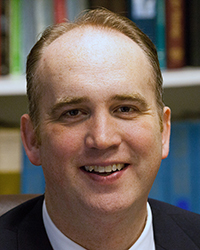

by Bruce Reeves
Synopsis: If one is saved at all, he is a member of Christ's church; if he is a faithful member of the church, he is saved.
The religious world reflects division, chaos, and confusion (1 Cor. 1:10; 14:33). Today, we observe thousands of denominations teaching different doctrines on critical spiritual questions, yet they are all claiming to follow the one faith. Is this really what Christ wanted? Jesus desires that His people be united on the basis of truth as a proclamation of His grace (John 17:20-21; 2 John 9-11).
Sadly, some members of local churches of Christ have a denominational view of the Lord's church, but they think their denomination is the best one. As a result of a diminished view of the authority of the Scriptures, they also have a low view of the church. Yet, the Bible presents a high view of both the Scriptures and the Lord's church! Let us consider Christ's conversation with Peter in Matthew 16:13-19.
Our conceptual understanding of the church is critical to our appreciation for it as the fulfillment of God's "eternal purpose" (Eph. 3:10-11). The church is composed of the redeemed people of God who have been called out of the world by the gospel (2 Thess. 2:13-14).
The universal church includes the whole company of the saved who are in a relationship with Christ. The church is not part of the saved; the church is the saved (Acts 2:47; Eph. 5: 23; 1 Pet. 2:5, 9). This term is not used biblically to refer to humanly devised boards, councils, synods, etc., but rather to the saved.
The church does not save me, nor does she administer grace. Christ is my Savior, Redeemer, and Lord (John 14:6; Acts 4:12; Eph. 5:23). The Lord adds us to the church as a result of our having been saved: "So then, those who had received His word were baptized . . . and the Lord was adding to their number day by day those who were being saved" (Acts 2:41, 47).
As the Lord saves, He adds, and as He adds, He saves. Therefore, if one is saved at all, he is a member of Christ's church, and if he is a member of the church, he is saved. One cannot be saved outside of the church of Christ, nor can he be lost if he remains a faithful member of the body of Christ (Eph. 1:3, 22-23; 4:4; 5:23; Col. 1:17-18; Heb. 12: 22-23). The universal church is made up of individual believers, not local churches (1 Cor. 12:12-13, 27). The notion that local churches tied together constitutes the universal church is an unbiblical concept.
In the New Testament, local churches were autonomous and self-governing groups of Christians overseen by shepherds (1 Tim. 3:1-7; Titus 1:6-11). Local congregations are composed of individual members who agree to join together in fellowship (Acts 9:26), worship in a common assembly (1 Cor. 11:18), work out of a common treasury (1 Cor. 16:1-3) and submit to a common oversight (Acts 14:23; 20:28; 1 Pet. 5:2-3).
The local church is all-sufficient to fulfill the work God has given His people (Eph. 4:11-16). This truth, however, does not deny individual responsibilities that we all have as disciples but emphasizes the wisdom of God in ordaining the organization and work of the local church (Matt. 18:15-17).
It is distressing to see the low estimation some have of the local church, as well as their dismissive spirit toward the New Testament pattern for the work of local congregations. It is disconcerting when brethren have clarity regarding sound hermeneutical principles on such issues as salvation, instrumental music, marriage, divorce, and remarriage, but then abandon such principles when attempting to defend the social gospel at work in local churches of Christ. Church-sponsored and funded parachurch organizations (see endnote) among our brethren, although seemingly well-intended, manifest an underlying, but real dissatisfaction with the local church as God designed it. We must define the church the way Christ did.
When asked, "Who do you say that I am?" Peter unequivocally confessed the deity of Christ, saying, "You are the Christ, the Son of the Living God" (Matt. 16:13-16). Jesus emphatically affirms the church's true foundation: "Blessed are you, Simon Bar-Jonah, for flesh and blood has not revealed this to you, but My Father who is in heaven. And I also say to you that you are Peter, and on this rock I will build my church . . ." (Matt. 16:17-18).
The notion that this "rock" refers to Peter is untenable. The "rock" of which Jesus speaks is the truth that Peter confessed concerning the deity of Christ. The apostle Paul explicitly taught that Christ is the foundation of His church: "For other foundation can no man lay than that is laid, which is Jesus Christ" (1 Cor. 3:11). Even when speaking of the "foundation of the apostles and prophets," Paul communicates this same truth by metonymy: "Jesus Christ . . . being the chief cornerstone, in whom all the building fitly framed together grows into a holy temple in the Lord . . ." (Eph. 2:20-21).
The certainty of the church is discerned in Christ's statement, "I will build my church . . ." (Matt. 16:18). Despite the unbelief of the Jewish leadership, the oppression of Roman rule, and the shortcomings of His disciples—Jesus declares the certainty of the establishment of His church. The church is the manifestation of God's wisdom, sovereignty, and power and far from a mere contingency plan (Eph. 3:10-11). There is no uncertainty in the words of Jesus. What a blessing it is to know that God is faithful to His promises!
The prophets foretold of the timeframe of the coming of the Messianic kingdom (Isa. 2: 2-3; Dan. 2:44-45). John the Baptist and Jesus both affirmed the imminence of its arrival to those alive during their ministries (Matt. 3:1-2; 12:28; Mark 9:1). Christ instructed His apostles to remain in Jerusalem for the power of the Holy Spirit, which would be poured out on Pentecost (Luke 24:46-48; John 14-16; Acts 2:1-4). On the day of Pentecost, Peter proclaimed that Christ was reigning over His kingdom on the throne of God (Acts 2:29-36; cf. Dan. 7:13-14). Interestingly, after Pentecost, we read of believers being "translated into the kingdom of God's dear Son" (Col. 1:13) and of our reception of an immovable kingdom (Heb. 12:28). The certainty of Jesus's statement, "I will build my church," is indisputable.
The Lord also emphasizes the intimacy of the relationship that He would sustain with His church when He said, "I will build my church" (Matt. 16:18). Nowhere is this truth seen more clearly than in Paul's treatment of Christ and His church through the analogy of the marriage relationship. The apostle vividly describes the sacrificial headship of Christ over the church (Eph. 5:23-25), the sanctifying purpose of the Savior for His bride (Eph. 5:26-27) and the selfless devotion of Christ for His people (Eph. 5:28-32). The Lord's provision and protection for His church demonstrate His love for His people.
How anyone could fail to see the great value of the church in light of the truth that Jesus Christ "purchased the church with His own blood" is unimaginable (Acts 20:28). The church is presented as "the body of Christ" and Jesus as her spiritual head (Eph. 1:22-23; 4:4; Col. 1:18). When Saul was persecuting the church (Acts 8:1), Jesus asked him, "Saul, why do you persecute Me?" (Acts 9:4). When enemies of the Lord persecute God's people, they are sticking their finger in God's eye (Zech. 2:8; Matt. 18:6).
Jesus said, "Upon this rock, I will build my church, and the gates of hades shall not prevail against it" (Matt. 16:18). This statement was not a denial that enemies of truth would oppose His redemptive work, but it was a promise that death would not prevent the victory of the church. Death would neither stop Christ from building the church nor spell defeat for those who comprise it. Christ manifested His power over death (Rom. 6:9; Heb. 2:14-15). His resurrection demonstrates His intercessory life (Isa. 28:16-18; Acts 2:25-28; Rev. 1:17-18). In Jesus Christ, death and hades have no power over us (1 Cor. 15:55-57).
The Lord promises Peter apostolic authority in the preaching of the gospel and the entry of sinners into the church (Matt. 16:19; 18:18; 23:13; Luke 11:52). The kingdom is something to be entered, and Peter would show people how they could enter by proclaiming the gospel (Acts 2, 10). When Jesus promised Peter and the apostles, "Whatever you bind on earth will be bound in heaven and whatever you loose on earth will be loosed in heaven," He was not writing them a blank check to do and say whatever they desired. The form of the verbs, "bind" and "loose," can correctly be translated, "Whatever you bind on earth shall have been bound in heaven and whatever you loose on earth shall have been loosed in heaven." Peter was only to teach heaven's will (Matt. 6:10). Thank God for the apostolic message of the gospel (Heb. 2:3-4), and the establishment of the church of our Lord and Savior Jesus Christ (Eph. 3:20-21).
Author Bio: Bruce has labored with the Highway 65 church of Christ in Conway, AR for twenty years. He and his wife, Rachel, have one child. The church website is hwy65churchofchrist.org. He can be reached at brochuck1@aol.com.
